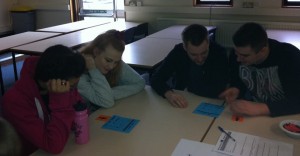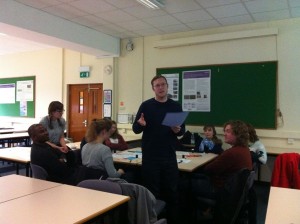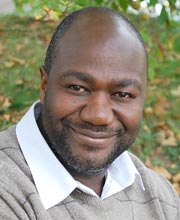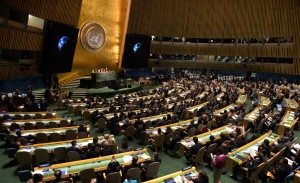Geography students studying ‘Resilience for Sustainable Development’ had a change from their normal lecture format recently and instead played a game. This wasn’t just for fun though, as ‘serious gaming’ is becoming a popular way of sharing complex information with a range of potential users and giving them opportunity to discuss its use. The students played CAULDRON, a game developed by members of the ACE-Africa project (University of Reading (Parker, Cornforth and Boyd) and Oxford University) together with the Red Cross/ Red Crescent Climate Centre, who have lots of experience designing games to communicate climate information. This game was developed to present the science of extreme weather event attribution in an accessible way, and provide space for discussion about whether it could be used in climate policy.
CAULDRON stands for Climate Attribution Under Loss and Damage: Risking, Observing, Negotiating. This reflects the fact that loss and damage due to extreme weather events is occurring all over the world and people are taking an interest in whether this is due to climate change. Negotiations are also currently taking place to work out how to address this loss and damage under the United Nations Framework Convention on Climate Change (UNFCCC). The game gives players the chance to experience having to make decisions under uncertain climate risk, something many people have to do in reality every day. They also have to analyse changes in risk with only limited data and deal with the difficulties of negotiating with other players with different interests.

The game began with players given the role of farmers who had to plant crops each season. They were each given beans to symbolise their crops and a ‘rainmaker’, which was a small pot containing a dice, to shake to determine their rainfall each season. Players who had good rains gained more beans, while those with drought years lost beans. Some players ended up in crisis with too few beans to be able to plant, so had to try and strike up deals with fellow players to be lent beans so they could keep playing!
Climate change can affect the probabilities of extreme weather events occurring, so for the next part of the game players were given new rainmakers. Some of these contained dice with increased probability of drought which would ruin crops, but players didn’t know which! Suddenly, there seemed to be more droughts happening and more players getting into crisis.

Players try to figure out their best farming strategy
For the next part of the game, players became scientists. Using new rainmakers as ‘climate models’, they produced more statistics to help them work out whether their risk of drought had been altered by climate change. How trustworthy were the results provided by their models though?
Players became negotiators at the UN climate negotiations for the final part of the game. They had to work out how they were going to deal with the fact that some players had collected more beans than others. Some players had been acting as developed countries and so, along with fewer losses, they had greater historical emissions. Were they to blame for losses in the developing countries? After much debate, each group managed to come up with an agreement that all players were happy to sign. However, some players did say they felt they had been bullied into making agreements and noted that the develop countries were denying that climate change had happened at all! Solutions presented to address the loss and damage at the end of the game included clearance of debts that had accumulated between players, rules on farming strategies that would be used in the future, and agreements on transfer of beans for when players got into crisis. With such a range of ideas diplomatically expressed, maybe we have uncovered some of the negotiators of the future!

A spokesperson reads out his region’s signed agreement to address loss and damage
By the end of the game, all the players said their knowledge of extreme event attribution had been improved. One player said their understanding had been improved ‘by creating a situation where extreme events had ‘real’ consequences and a political ‘reality’’. This is the key feature of participatory gaming, that players can experience the emotions involved and have to act under uncertainty rather than just learning about it theoretically. Furthermore, it provides insights into the challenges of climate negotiations and the inequality between developing and developed countries, along with the difficulties in separating the impacts of climate change from other factors.
This has been just one of the many times the CAULDRON game has been played, which have included players from sectors ranging from climate science to civil society. Each time the game has prompted lively discussion about event attribution science and dealing with the impacts of climate change and demonstrated that ‘serious gaming’ can be an effective, but also fun, way of sharing climate research.
 Nick chaired a workshop at the conference on “working with academia”, which included speakers from Imperial College (Silwood Park) and Mike. The aim was to share experiences about the working relationship between heathland managers and Universities (e.g. ecologists, geographers, environmental scientists, archaeologists), and to discuss how this relationship can be improved through co-production of research projects, and better communication of data.
Nick chaired a workshop at the conference on “working with academia”, which included speakers from Imperial College (Silwood Park) and Mike. The aim was to share experiences about the working relationship between heathland managers and Universities (e.g. ecologists, geographers, environmental scientists, archaeologists), and to discuss how this relationship can be improved through co-production of research projects, and better communication of data.







